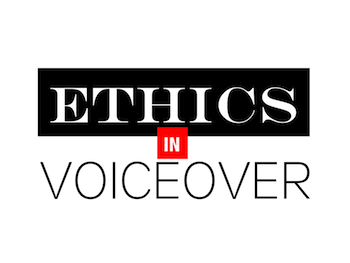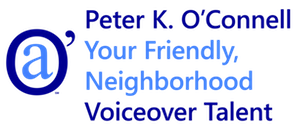Share
 One of the many panel discussions that took place at VO Atlanta talked about Ethics in Voiceover. Fortunately, the discussion was not entitled “In Search of Ethics in Voiceover”.
One of the many panel discussions that took place at VO Atlanta talked about Ethics in Voiceover. Fortunately, the discussion was not entitled “In Search of Ethics in Voiceover”.
That would have been sad.
Overall, ethics-wise, I think the voiceover industry does pretty well. Maybe an 80-85 out of 100.
Ethics is defined, as you probably know, as being the moral principles that govern a person’s behavior or the conducting of an activity.
We all have ethics and morals but differing degrees of each.
I did not attend that session because I was doing something else so I cannot give a fair (or really any) representation of the discussion. Those who did attend seemed to enjoy it.
One of the panelists during that particular session is a voice talent I have been friendly with for a number of years and who is also a fellow blogger, Paul Strikwerda. According to his published statistics, his blog is much more widely read than mine.
Here, I just have you and me, while Paul’s blog is read by thousands. Can’t say as I blame the readers because I’ve read my stuff. Just long winded pablum here 🙂 .
So Paul wrote about his experience at VO Atlanta on his blog and also about his answers during the Ethics Panel he was a part of. Having read his responses on the blog, I do not take exception to any of his answers because his answers about ethics come from his perspective and they are his way to approach his business. We all do this individually in every line of work – which is precisely what makes such a public discussion tricky, in MY opinion.
But the one question from the panel that Paul highlighted in his blog (I believe he was asked the question, he did not ask it himself) elicited from me a response different from Paul’s.
Two people, two perspectives, each right within their own views. Your milage may vary. Consult your doctor before taking any medications.
The question was:
Do voice talent have an obligation to consider the impact of their pricing on the greater voiceover industry?
Paul’s full answer to the panelist’s question can be found here, but in short, his answer is yes, talent do have an obligation to consider the impact of their pricing on the greater industry.
Peter’s full answer to the question can be found below, but in short, his answer is no, talent do not have an obligation to consider the impact of their pricing on the greater industry.
Full disclosure: if you asked ’15-20 years ago Peter’ the answer to this question, I would have said ‘yup, they do…no low balling ever, hurts all of us! End of story.’ I might have even stomped my foot or harrumphed! Possibly both.
‘Today Peter’ still believes that that lowballing is a lose-lose tactic. It’s a poor business tactic that to me shows desperation, a horrible lack of self worth and undermines the low bidder’s professionalism (both real and perceived). So I don’t do it and I don’t think others should either.
I’ve said so many times, in many forums. Again, sometimes with a harrumph!
But in this panel discussion, the question focused on whether there is an ethical obligation to consider your fellow voice professionals when crafting your own pricing.
From a competitive and business standpoint? Sure.
From a moral stand point, no.
All low-ballers are not unscrupulous opportunists. I know this because I’ve met some of them, spoken with them and heard their stories. One would be unfair, unkind and unprofessional to paint these folks that I’ve met with a broad brush stroke of being sleazy or something worse.
But I would generally categorize these low ballers as often (but not always) being desperate, somewhat ignorant regarding business and most surely lacking professional confidence. Those that I have met are guilty on all three counts. Do their actions hurt our industry? Yup.
But what are their reasons for their low rates? Let’s look at that for a moment.
Of the three categories above, I’d like to focus on desperate. Specifically, I mean financially desperate.
Whether it’s to make a mortgage payment, a car payment or just put food on the table, many of the low-ballers in voiceover that I have met don’t have much money and aren’t sure how to make it. They cannot listen to nor hear a discussion about fair pricing in VO because they have significant money issues as well as an unceasing fear throbbing in their head that drowns out the discussion.
For better or worse, that is their life situation. They are in survival mode, sometimes barely survival mode.
Now, the harder edged me of some years ago would have told them ‘then maybe VO isn’t for you and get out of the business’ or at least get a second job! But watching and listening, I see how edicts and absolutes don’t fit each and everybody.
So am I to stand on a rock looking down on these low-baller folks with a pointed finger and a booming voice, questioning their moral responsibility to their fellow voice actors about pricing if they can’t feed their kids because they lost a job by charging $50 more, just so it fell in line with industry standards? Short answer: no.
Regarding the above statement, I will add here, lest you think I’m being accusatory, I do not believe Paul or many others would answer yes. In addition to the individual perspectives that I mentioned earlier, there are always individual situations. That’s why ethics and morality are necessary but they are soooo tricky. You gotta look case by case.
Yes there ARE really sleazy individuals and companies in voiceover who undermine our professional standards, including rates. Those folks need to be publicly and frequently called out for their unprofessional behavior. Bang the drum, hand me a drum stick!
But I cannot personally exclaim a universal moral decree that every voice talent must think of others (and fall in line) when crafting their pricing structure. If you need that, join a union, which is built on a national rate card! That’s a real benefit.
My point is not every low baller is “a bad guy”. And beyond that, there are no simple or absolute answers.
Tags: commentary, voiceover advice by peter k. o'connell, your friendly, neighborhood voice-over talent
6 Comments »
 Voiceover talents love their email blasts.
Voiceover talents love their email blasts.
 One of the many panel discussions that took place at
One of the many panel discussions that took place at  Having now attended two VO Atlantas, I am pleased to say that I believe this one was better than the last one. Better organized, better programmed and, not that they can control this aspect (and it’s completely subjective on my part) but there seemed to be a better mix of people.
Having now attended two VO Atlantas, I am pleased to say that I believe this one was better than the last one. Better organized, better programmed and, not that they can control this aspect (and it’s completely subjective on my part) but there seemed to be a better mix of people. For me, the most impressive part of the programming was the list of producers, performers and agents organized by MaryLynn Wissner (pictured) of
For me, the most impressive part of the programming was the list of producers, performers and agents organized by MaryLynn Wissner (pictured) of  RALEIGH, NC March 17, 2017 – – When the very young Peter K. O’Connell began his voiceover at a Dayton, Ohio radio station in 1982, Madonna didn’t have her first hit song yet, Reagan was president and the Internet wasn’t even a thing! Oh and O’Connell sported a mullet (business in front, party in the back).
RALEIGH, NC March 17, 2017 – – When the very young Peter K. O’Connell began his voiceover at a Dayton, Ohio radio station in 1982, Madonna didn’t have her first hit song yet, Reagan was president and the Internet wasn’t even a thing! Oh and O’Connell sported a mullet (business in front, party in the back). A silver lining?
A silver lining?
